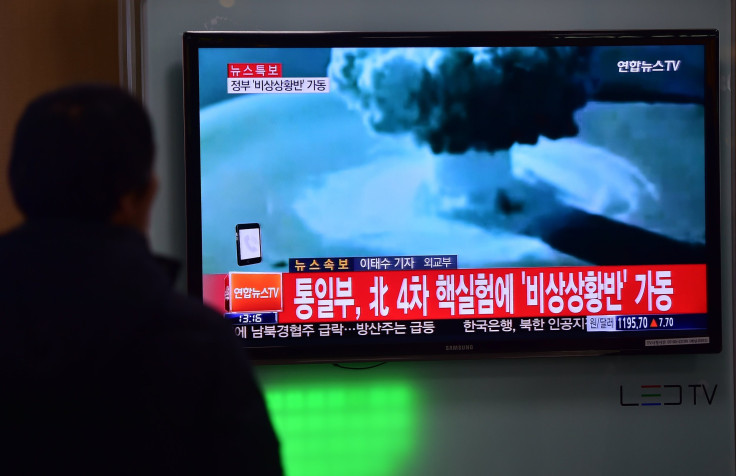Obama, South Korea’s Park Geun-Hye Plan ‘Strong’ Response To North Korea’s Apparent Nuclear Test

U.S. President Barack Obama spoke on telephone with his South Korean counterpart Park Geun-hye late Wednesday about nuclear threats from North Korea and agreed to take all security measures for protecting South Korea. The move comes after Pyongyang said earlier in the day that it has successfully tested its first hydrogen bomb.
"The two leaders condemned the test and agreed that North Korea's actions constitute yet another violation of its obligations and commitments under international law, including several U.N. Security Council Resolutions," the White House said in a statement.
"President Obama reaffirmed the unshakeable U.S. commitment to the security of the ROK [Republic of Korea], and the two leaders agreed to work together to forge a united and strong international response to North Korea's latest reckless behavior," it added.
The U.S. and South Korea are also discussing ways to deploy "strategic" U.S. military assets on the Korean peninsula, South Korea's state-run news agency Yonhap reported, citing the defense ministry.
"Joint Chiefs of Staff Chairman Gen. Lee Sun-jin and U.S. Forces Korea commander Gen. Curtis Scaparrotti held a face-to-face meeting in the afternoon yesterday and discussed the deployment of U.S. strategic assets on the Korean Peninsula," an official representing the defense ministry told Yonhap, adding: "Specifics, including when the strategic assets will come here, have not been concluded yet."
The official added, according to Yonhap, that both the countries were reviewing several ideas in relation to the deployment.
Anthony Cordesman, a defense policy expert at the Washington-based Center for Strategic and International Studies, told Reuters that the U.S. has been limited in its military response in the region due to fear of not knowing how the reclusive nation will react. "Any escalation in this region, any over-reaction can easily lead to not only a conflict between South and North Korea, but drag China and the United States and Japan into a confrontation" as well, Cordesman said.
Meanwhile, U.S. Defense Secretary Ashton Carter also assured Seoul of his country’s commitment to South Korea, which sees the hydrogen bomb test as a security threat. Carter spoke to South Korean Defense Minister Han Min-koo to discuss how to increase their security collaboration. The two also vowed not to recognize North Korea as a country with nuclear power in the international community.
"Secretary Carter reaffirmed the U.S.' ironclad defense commitment to South Korea, and this includes all kinds of extended deterrence assets," Han reportedly said in a joint statement with Carter.
While the U.S. State Department confirmed that Pyongyang conducted a nuclear test, it disputed the claims that it was a hydrogen bomb. "The initial analysis is not consistent with the claim the regime has made of a successful hydrogen bomb test," White House spokesman Josh Earnest said, according to Reuters.
Other international powers and organizations also condemned North Korea’s move while the United Nations is reportedly exploring possibilities to impose additional sanctions on North Korea.
In a statement, released Wednesday, U.N. Security Council President Elbio Rosselli said, according to CNN, that the organization is set to implement "significant" punitive measures on North Korea. The 15-member council deemed the test a "clear violation of [past] resolutions ... and of the nonproliferation regime," and "strongly" condemned it. The statement follows a closed-door meeting Wednesday of the council, which includes China, Russia and the U.S., where officials discussed how to curb Pyongyang's nuclear abilities.
© Copyright IBTimes 2025. All rights reserved.





















